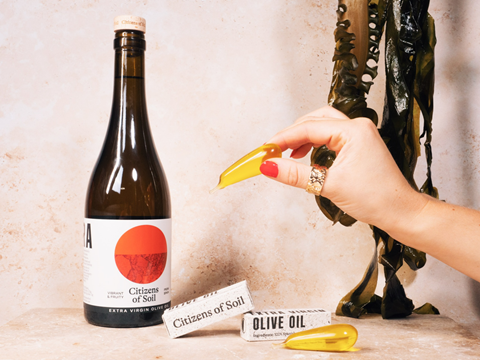
In a reported UK market ‘first’, Citizens of Soil is launching single-serve extra virgin olive pipettes for its Spanish Extra Virgin Olive Oil (EVOO), packaged in Notpla’s plastic-free material made with seaweed.
The pipettes are said to be 100% natural, biodegradable, home compostable, vegan, and even edible. To use the pipette, consumers pinch and twist the nib to remove, before squeezing the pipette for a controlled drip release.
Notpla won the 2022 Earthshot Prize, a climate initiative founded by Prince William, for turning seaweed into a plastic packaging alternative. The material has apparently been named the ‘first and only’ material recognised as plastic-free by a European Union country, and the company says that to date, its solutions have replaced 16 million pieces of single-use plastic that would otherwise have entered the environment.
Citizens of Soil states it was the first brand in the UK to offer refill options for extra virgin olive oil when it launched its ‘lower-waste’ pouches in Waitrose last year, with its core range available on Ocado as of this month. The company is aiming to improve transparency in the olive oil category by displaying quality indicators on pack, such as the harvest date, specific olive varieties, producer information and polyphenol (antioxidant) count, and claims to have ‘full traceability from farm to fork’.
In September, Notpla revealed it had completed a £20 million (€23,924,400) Series A+ fundraising round and plans to replace over 100 million units of single-use plastics annually, scaling its seaweed-based packaging in the United States. Its seaweed-lined paper solutions are currently used in stadiums and venues like the O2 Arena, Allianz Stadium, and the grounds of football teams Aston Villa FC and Tottenham Hotspur; as well as by major corporations including Compass Group and Just Eat Takeaway.
The previous month, PA Consulting and Searo Labs unveiled seaweed-based packaging items in hopes of cutting down on the global consumption of plastics, single-use packaging, and PFAS within the food, personal care, and home care sectors. Searo’s materials are said to be home compostable, heat sealable, optically clear, safe for food contact, and controllable in terms of moisture and texture.
If you liked this story, you might also enjoy:
The ultimate guide to the Packaging and Packaging Waste Regulation in 2024
How are the top brands progressing on packaging sustainability?
Sustainable Innovation Report 2024: Current trends and future priorities
Everything you need to know about global plastic sustainability regulation














No comments yet